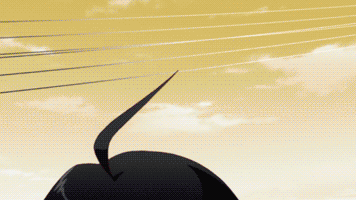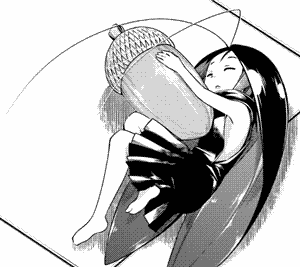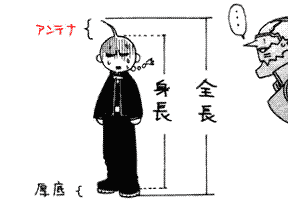In English, "cow lick" refers to something similar.
Appearance
Although it originates in a mere "cow lick," the ahoge as seen in anime can take many forms, some pretty bizarre. They can look like a banana, or a sickle, or become disturbingly long. Sometimes, they can even have a life of its own.Multiple Strands
The classic shape for the ahoge is single-strand (ippon 1本), but there are also ahoge with two strands (ni-hon 2本) and three strands (sanbon 3本).By the way, hon 本 is the counter for hair strands. That's because hon 本 counts objects of long, cylindrical shapes, and hairs have long, cylindrical shapes.
Ahoge That Changes Shape
In some anime, the ahoge of a character can change shape according to their mood. This, obviously, doesn't make any sense. But it can happen nonetheless. Because anime.
Anime: Haiyore! Nyaruko-san 這いよれ!ニャル子さん
This expressive ahoge is drawn as if it's part of the character's facial expression. It can twitch and deform around in reaction to what the character just hear someone say, for example.
Anime: Bakemonogatari 化物語 (Episode 4)
Real Life Ahoge
The word ahoge アホ毛 isn't an anime-only word, it's a real word used toward real people that's also used toward character in anime. The only difference is that the ahoge of real people is really a "cow lick" and not a thick flailing banana-hair as the ahoge found in anime.For reference:
- あほ毛研究所 - utena.co.jp, accessed 2018-12-22.
A Japanese page about how to deal with ahoge in real-life.
"Stupid Hair"
Literally, ahoge アホ毛 means "stupid hair" or "idiot hair." That's because it combines aho アホ, which, like baka 馬鹿, means "stupid" or "idiot," with ke 毛, that means "fur" or "hair."You may notice the "hair" morpheme is ke 毛, not ge 毛, and yet the word is ahoge アホ毛, not ahoke アホ毛. This happens because of a change in pronunciation called rendaku 連濁, in which suffixes get diacritics (dakuten 濁点). If we write the word without kanji we can see the diacritics:
- ahoke
あほけ - ahoge
あほげ
This also happens in other words. For example:
- mayu 眉
Eyebrows. - mayuge 眉毛
Hair of the eyebrows.
The word kami no ke 髪の毛, "hair of the head," is an example of ke 毛 not getting a diacritic.
Idiot Hair isn't an Idiot's Hair
Although ahoge アホ毛 can mean "idiot hair," that doesn't mean the character with ahoge is an idiot. It means the hair is an idiot. An idiot for not behaving like other hairs, for being a misbehaving hair.Then again, it doesn't mean the character won't be an idiot either. The idiocy of the hair and its owner are completely unrelated.
"Antenna Hair"
Shokkaku 触角
The word shokkaku 触角, "[insect's] antennae," more literally, "feelers," can also refer to a two-strand ahoge, i.e. "antennae hair," because of how it looks like the antennae insects like ants and cockroaches use to feel their surroundings.
Manga: Gokicha ごきチャ (Volume 1, Page 9)
- A cockroach drawn as a cute anime girl.
Antena アンテナ
The word antena アンテナ, a katakanization of the English word "antenna," refers to an antenna like those of TVs, radio, etc. used to capture signals. It can also refer to the single-strange ahoge, i.e. "antenna hair."
Manga: Fullmetal Alchemist, Hagane no Renkinjutsushi 鋼の錬金術師 (Volume 2)
- Context: omake from second volume: Edward Elric エドワード・エルリック is asked his height.
- zenchou 全長
Full length. - shinchou 身長
Body length. Height. - antena アンテナ
Antenna. - atsuzoko 厚底
Thick soles.
"Hair Antennae"
In English, "antenna hair," "antennae hair," or "hair antennae," refers to hair that have two strands coming out of it, like an insect's antennae. There's a couple of things to note about this.Antenna vs. Antennae
To begin with, the word "antenna" is singular, "antennae" is plural. [antenna - merriam-webster.com, 2018-12-22]So if it was one strand, it would be one "antenna" hair, but since it's two strands, the right word should be two "antennae" hair.
You'll see most English dictionaries will call it "hair antennae," as in, two antennae by coincidence found in somebody's hair. Maybe so it doesn't imply it's a hairstyle called "antennae hair."
On the other hand, most people just call it "antenna hair," because it's easier to say it that way.
Ahoge vs. Hair Antennae
A number of English sources have decided to divide the anime hair world into single-strand ahoge and two-strand "hair antennae." Consistently claiming that ahoge and hair antennae can't overlap.- "Consisting of a single, often large, lock of hair sticking out from the top of the head, it is most often used to identify foolish, bumbling or carefree characters." [ahoge - anidb.net, accessed 2018-12-22]
- "Hair antennae are two, or sometimes more, strands of hair that stick up from the top of the head and curve forward like antennae. Not to be confused with ahoge ("idiot hair"), which only has one strand and is commonly associated with idiots." [hair antennae - anidb.net, accessed 2018-12-22]
- "Two strands of hair that stick up from the top of the head and curve forward like antennae. [...] If the character has only one strand, it is Idiot Hair." [Hair Antennae - tvtropes.org, accessed 2018-12-22]
- "A single (usually short and fat) lock of hair that sticks out of an anime character’s head. [...] To be differentiated from antenna hair, which is two or more thin locks of hair as opposed to only one." [ahoge - urbandictionary.com, 2018-12-22]
However, according to Japanese sources, the term shokkaku 触角, "[an insect's] antennae," can be used toward ahoge too.
- shokkaku ni nita ahoge, maegami...
触角に似たアホ毛・前髪…
Ahoge, bangs, that look like an insect's antennae. - 触角 - dic.pixiv.net, accessed 2018-12-22.
- ahoge wa ippanteki ni, ippon ka nihon no mono ga ooi.
アホ毛は一般的に、一本か二本の物が多い。
Ahoge, generally, is often one or two strands. - nihon no baai wa shokkaku to yobareru koto mo aru
二本の場合は触覚と呼ばれることもある
In the case of two strands it's also called antennae. - アホ毛 - dic.nicovideo.jp, accessed 2018-12-22.
So the usage of ahoge and shokkaku in Japanese may differ from the usage of ahoge and "hair antennae" in English.






No comments: